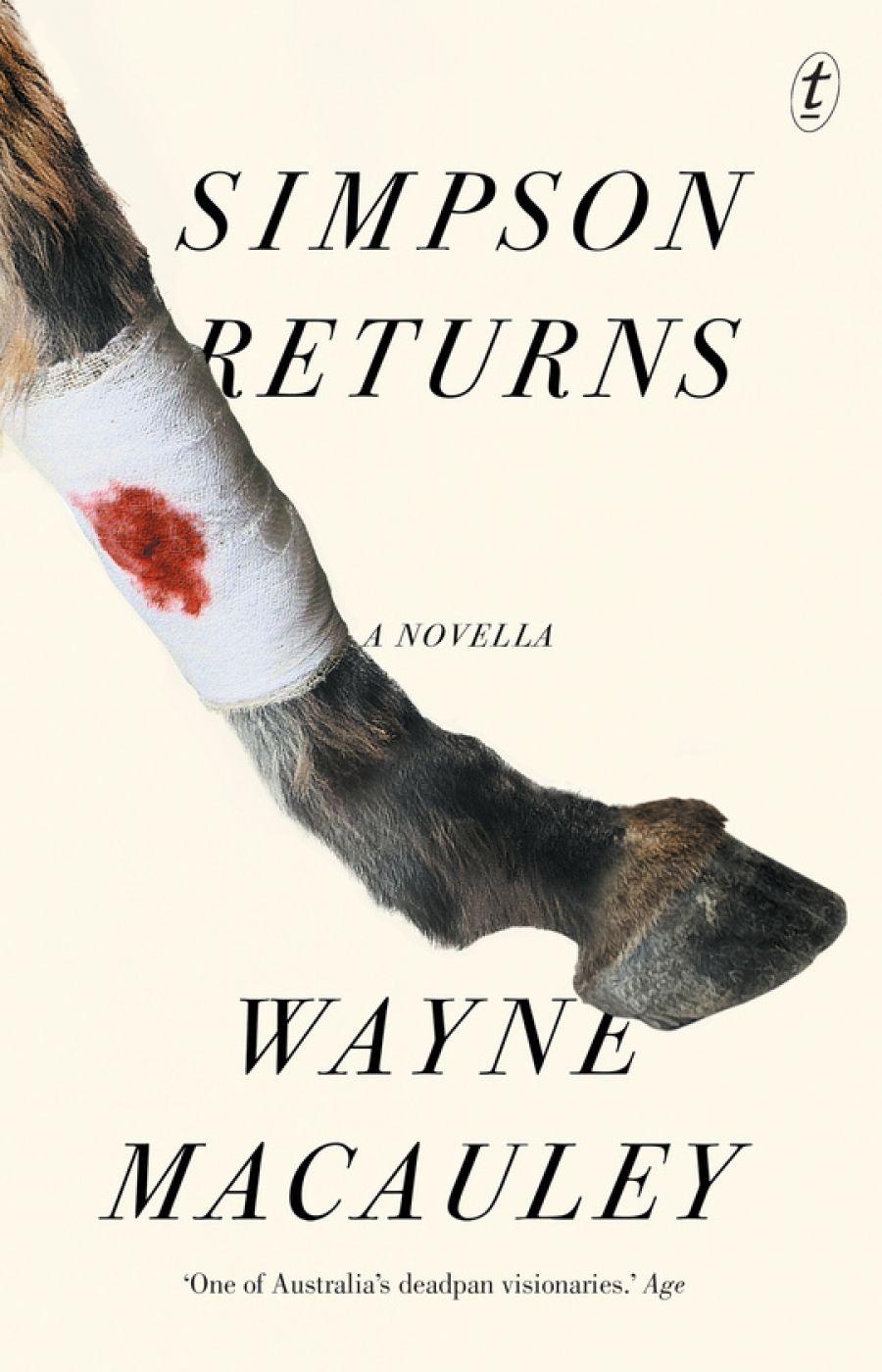
- Free Article: No
- Contents Category: Fiction
- Review Article: Yes
- Online Only: No
- Custom Highlight Text:
Care and compassion, a fair go, freedom, honesty, trustworthiness, respect, and tolerance. These were the nine ‘Australian values’ that former Liberal Opposition Leader Brendan Nelson demanded be taught in schools, especially Islamic schools, across the nation in 2005. How? ...
- Book 1 Title: Simpson Returns: A novella
- Book 1 Biblio: Text Publishing, $19.99 pb, 144 pp, 9781925773507
We never actually get anywhere near the Inland Sea; despite ‘eighty-eight years resurrected’, Simpson has managed to venture ‘no further than the dry creek beds and back roads of country Victoria’. Impeded by his self-described ‘Inveterate Samaritanism’, he is unable to pass anyone in need: ‘A moan, a wail, a whimper, and I was there like a dog to a bone.’ Each character Simpson heals – ‘a widow, a disabled, a refugee, an addict, an orphan’ – offers their own unique tale of woe, but each also prompts essentially the same question from Simpson and reader alike: ‘in a land of fatted calves why do you look so horribly thin?’
These stories within a story – a format also used in Demons (2014) – might read like the sort of hard-luck realism our literary culture breeds like rabbits, were it not for Macauley’s well-honed, deadpan wit, which skips across even the darkest joke: ‘For Denis the main disadvantage of being raised by Christian men, aside from the obvious risks, was that they never told him he was ugly.’ A section in which a divorced mother fails to gas her children, due to a mismatch between hose and hatchback exhaust pipe, somehow manages to be harrowing and farcical at the same time, in the manner of Macauley’s breakout (and gross-out) novel, The Cook.
 Wayne Macauley (photograph by Darren James)Simpson’s philosophical musings on kindness stitch these tales together, although it is difficult to pin down exactly which ‘man with the donkey’ we are given here. He doesn’t appear to be the historical Kirkpatrick – he neither pines for north-east England nor speaks its patois – but he also isn’t the whistling-to-his-death larrikin of lore. This Simpson rages against those who turned suffering into Anzac jingoism – ‘thrown to our deaths by indifferent men, our courage and laughter in the face of adversity now sells their snake oil for them’ – and he questions how Australians manage to conceive of ourselves as solicitous without ever really rolling up our sleeves: ‘is it that we see selflessness as a selfish thing? That the greatest danger in stopping to help is that someone might think you’re putting on airs?’ When Simpson promises to heal Laura – an abused woman who is also the sole ‘patient’ to appear in both the short story and novella – her brother reacts with understandable cynicism: ‘people are always saying that’. Tellingly, as Simpson’s powers begin to fade, it is Laura who comes to his aid with ‘mallee root water’ and a ‘grass basket’ of ‘broom ballart cherries, geebung drupes, quandong with sugarwood sap’ – the ministrations of a people who use stories and legends to edify their communities, not dupe them.
Wayne Macauley (photograph by Darren James)Simpson’s philosophical musings on kindness stitch these tales together, although it is difficult to pin down exactly which ‘man with the donkey’ we are given here. He doesn’t appear to be the historical Kirkpatrick – he neither pines for north-east England nor speaks its patois – but he also isn’t the whistling-to-his-death larrikin of lore. This Simpson rages against those who turned suffering into Anzac jingoism – ‘thrown to our deaths by indifferent men, our courage and laughter in the face of adversity now sells their snake oil for them’ – and he questions how Australians manage to conceive of ourselves as solicitous without ever really rolling up our sleeves: ‘is it that we see selflessness as a selfish thing? That the greatest danger in stopping to help is that someone might think you’re putting on airs?’ When Simpson promises to heal Laura – an abused woman who is also the sole ‘patient’ to appear in both the short story and novella – her brother reacts with understandable cynicism: ‘people are always saying that’. Tellingly, as Simpson’s powers begin to fade, it is Laura who comes to his aid with ‘mallee root water’ and a ‘grass basket’ of ‘broom ballart cherries, geebung drupes, quandong with sugarwood sap’ – the ministrations of a people who use stories and legends to edify their communities, not dupe them.
If Macauley sometimes overplays his message regarding the discrepancy between our hovering myths and our real actions – a dream sequence involving Donald Horne’s The Lucky Country is particularly on the nose – his sharp voice is still like a sip of the Inland Sea in this Sky Newsaganda, post-even-half-truth era. Books like this may amount to no more than a thumbtack on our master’s chairs, but Simpson’s worthwhile return leaves the concerned reader fresh-eyed to the importance of actually living up to, rather than just blowharding about, core values like care and compassion, a fair go, freedom, honesty, trustworthiness, respect, and tolerance. They should teach this book at school.


Comments powered by CComment